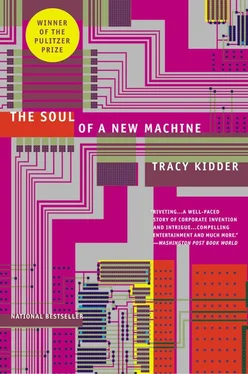From these distinctions, others hung. A seasoned executive in marketing explained, “With micros it’s even more competitive, but historically the world of minicomputers is very rough-and-tumble. IBM would say, ‘You got a problem, Mr. Customer? A team of four will be there in an hour.’ Implicitly a Data General would say to its customers, ‘You have to look out for yourselves.’ The sophisticated customer, particularly the OEM who buys a lot of computers and looks for discounts, not service, goes for minis. They’re capable of living in a rough-and-tumble world. And I’m not sure that IBM, with its organization, can compete in the traditional minicomputer market. It’s like putting a goldfish in a bowl with a piranha.”
So you could say that Data General entered a territory that asked for a certain brashness. And you could also say that life in this territory became less decorous than it had been, when Data General came along. They set out to get noticed, first of all.
In the lobby at Westborough hangs a copy of the first advertisement that Data General ever ran. It consists of just one page. On one side of the page is a grainy photograph of a man’s face. This person looks about to do something very mean. On the other side of the ad, he speaks: “I’m Ed de Castro, president of Data General Corporation. Seven months ago we started the richest small computer company in history. This month we’re announcing our first product: the best small computer in the world.” The message goes on for a while and winds up as follows:
Because if you’re going to make a small inexpensive computer you have to sell a lot of them to make a lot of money. And we intend to make a lot of money.
This ad’s chief architect, a man named Allen Kluchman, who was the company’s first director of marketing, told me with a smile, “That ad was independent of any aspect of Mr. de Castro’s personality that I knew about at that time. He’s the shyest guy I know. He’s essentially a pretty humble, private guy.”
The ad achieved a certain local fame. It said what many others presumably were thinking, but what none of them felt they should say publicly. For some years thereafter, most of Data General’s advertisements contained something slightly brazen. One of the best-known ads wasn’t published—some people in the company were by then apparently having second thoughts about the firm’s image. But a copy of this unpublished ad hangs in de Castro’s office. Over the Data General logo, on a field of white and blue, it reads:
They Say IBM’s Entry Into Minicomputers Will Legitimize The Market. The Bastards Say, Welcome.
Before Data General unveiled the NOVA in 1969—at the industry’s yearly fair, the National Computer Conference—the marketeer Kluchman talked a trade magazine into putting a picture of the NOVA on its cover. They rented billboards on the road from the airport to the conference and put a picture of the NOVA on them; at the hotel where most of the people attending the conference stayed, they talked the management into having bellboys distribute free copies of the Wall Street Journal with Data General’s advertising flyer inside; at the show itself, they raised the placard bearing their company’s name higher than any other. When it came to pricing their machine, they announced extraordinary discounts for customers who bought machines in quantity. Never mind that customers had to buy a virtual warehouse of NOVAs to get the truly big discount. Data General had brought a new ferocity, a bit of Forty-second Street, to the pricing of minicomputers.
“DEC owned 85 percent of the business and there was no strong number two. We had to distinguish ourselves from DEC,” Kluchman remembered. “DEC was known as a bland entity. Data General was gonna be unbland, aggressive, hustling, offering you more for your money…. We spread the idea that Data General’s salesmen were more aggressive than DEC’s, and they were, because ours worked on commissions and theirs worked on salaries. But I exaggerated the aggressiveness.”
According to Kluchman, DEC actually gave them some help in setting up “the Hertz-Avis thing.” DEC’s management, he said, ordered their salesmen to warn their customers against Data General. “It was great! Because their customers hadn’t heard about us.” Kluchman imagined DEC’s salesmen telling DEC’s customers that a dangerous new company was on the prowl, and DEC’s customers responding to this news by saying, “Where is this Data General, so we can be sure to avoid them? What’s Data General’s phone number, so we’ll be sure not to call it?” Kluchman laughed. “The calls just rolled in. DEC’s customers would say, ‘We hear you’re bad guys. You must be doing something we oughta know about.’ ”
And thinking back to those first heady days, when nearly every little strategy seemed to pay off, and the first millions started coming in, Kluchman said, “It was probably more fun than I or anybody else has ever had in business. It was great ego satisfaction. It was just a pure gas .”
At the end of fiscal 1978, after just ten years of existence, Data General’s name appeared on the list of the nation’s five hundred largest industrial corporations—in that band of giants known as the Fortune 500. It stood in five-hundredth place in total revenues, but much higher in respect to the various indices of profit, and for a while climbed steadily higher on the list. Surely by 1980 such a record entitled Data General to respectability. But some trade journalists still looked askance at the company; one told me Data General was widely known among his colleagues as “the Darth Vader of the computer industry.” Investors still seemed jittery about Data General’s stock. An article published in Fortune in 1979 had labeled Data General “the upstarts,” while calling DEC “the gentlemen.” The memory of that article, particularly the part that made it sound as if Data General routinely cheated its customers, still rankled Herb Richman.
Building 14A/B is essentially divided into an upstairs and a downstairs, and in one corner of the upstairs the corporate officers reside. A wall of glass separates them from the rest of the company. There is no mahogany here. If there is ostentation in the bosses’ quarters, it is ostentation in reverse. The table in their conference room, it was proudly said, was the same that they had used when the company was small. Richman’s office was comparatively plush. But saying, “We consider ourselves the Robert Hall of the computer industry,” Richman pointed out that he had paid for all his furnishings himself and that what looked like paneling on his walls was really just wallpaper.
Among the founders of the company, only de Castro—the much-talked-about president—and Richman remained engaged in daily operations. Richman had come up through the industry in sales—a supersalesman, some called him—and he had created and run Data General’s sales force, which was known if not notorious for its aggressiveness. Curly-haired, trim and in his forties, Richman wore a nicely tailored denim jacket and no tie. “I’m one of the few guys that money made a nice guy out of,” he said. “Before, I was just driven, clawing…. Success has made me more rational and introspective.” He remarked that not long ago he had been playing tennis with a man who had seemed to him just an ordinary fellow, but then he had found out that the man was actually president of an oil company. “And it was one of the largest oil companies in the world, and I was just in awe of him,” said Richman. He added, softly, “And yet I bet my net worth greatly exceeded his.”
The stock that Richman himself owned in Data General was worth about $13 million then, but, he seemed to say, he was unhappy with the way certain organs of the press depicted his company’s achievements. They were, Richman believed, too often depicted as “ruffians,” not as merely rough, which they were proud to be. “We agree that a lot of things we’ve done around here are wild,” he said. “But we can’t understand why we’re tabloid, instead of the New York Times .”
Читать дальше











